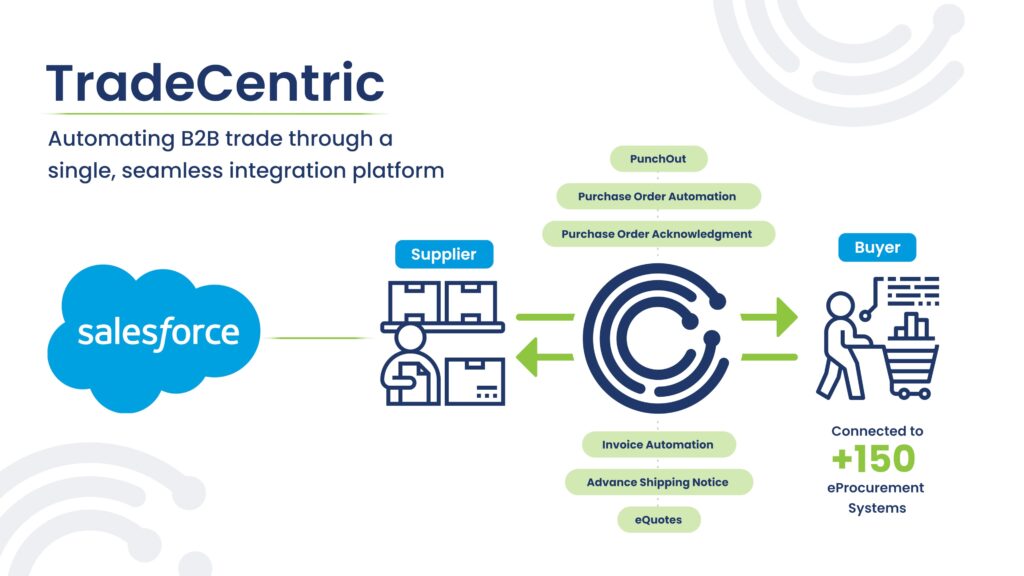Table of Contents
For both B2B buyers and suppliers, ensuring the security of your eCommerce platform and customer data is paramount. With the increasing number of cyber threats, businesses must prioritize security features that safeguard sensitive data and protect against potential breaches.
Salesforce Commerce Cloud, a leading and trusted eCommerce solution, offers powerful security features to help buyers and sellers mitigate risks and establish trust.
Let’s explore some of the key security features of Salesforce Commerce Cloud and how they can help you optimize your business functions.
Account Manager Security
Salesforce Commerce Cloud offers Account Manager Security, a centralized platform for managing user accounts and permissions. With this feature, administrators can easily control access to sensitive data and functionalities so that only authorized personnel can make changes or access confidential information.
The account manager security feature is vital in ensuring data protection, compliance, customer trust, mitigating insider threats, and maintaining brand reputation within Salesforce Commerce Cloud and similar platforms.
Data Privacy Features in Salesforce Commerce Cloud
When customers submit personal data, it’s important to safeguard it. Data privacy is a top concern for buyers and sellers alike. Salesforce Commerce Cloud prioritizes data privacy with built-in features that enable compliance with regulations such as GDPR (General Data Protection Regulation) and CCPA (California Consumer Privacy Act). Some of the ways it supports these industry standard compliance frameworks are:
- Data Protection and Privacy Controls: This includes features such as consent management tools, which allow businesses to obtain and manage customer consent for collecting and processing their personal data.
- Data Access and Portability: eCommerce companies can export customer data in a structured format to efficiently fulfill data subject access requests (DSARs) by providing data access and portability mechanisms.
- Data Deletion and Erasure: Businesses can honor the integrity of sensitive customer information by implementing data deletion and erasure processes upon request. In a new digital transformation era, part of customer loyalty can also be tied to how personal data is treated.
- Data Security: Personal data needs to be protected from unauthorized access, disclosure, alteration, or destruction. Data validation and security measures, such as cross-site scripting, encryption, access controls, and regular security assessments, also help safeguard customer data.
- Compliance Tools and Documentation: Salesforce provides guidance on configuring the platform to align with regulatory requirements and staying updated on changes to data protection laws.
- Auditing and Monitoring: Track access to personal data and monitor the data processing activities that continue compliance with GDPR, CCPA, and other regulations.
These features empower businesses to manage customer data transparently, including consent management and data access controls.
Security Best Practices
Salesforce Commerce Cloud advocates for security best practices to help businesses strengthen their defenses against increasingly sophisticated cyber threats. Regular security audits, implementing strong password policies, and keeping software updated with the latest patches and updates are just some of the security controls that eCommerce sellers can implement on their b2c commerce stores.
Ensuring browser protection and avoiding client browser based attacks, avoiding poor coding practices, and implementing processes to extend default functionality can all enhance your overall security posture.
Security Headers in SFRA
Salesforce Commerce Cloud’s Storefront Reference Architecture (SFRA) includes security headers that enhance protection against common web vulnerabilities such as cross site scripting (XSS) and clickjacking. These headers add an extra layer of defense by controlling how browsers interact with your website and preventing malicious activities.
SFRA benefits from a community of developers, partners, and contributors who share knowledge, resources, and best practices. The community provides forums, documentation, code samples, and other resources to help developers learn and troubleshoot issues more effectively. Additionally, Salesforce Commerce Cloud offers comprehensive support services, including technical support, training, and consulting, to assist businesses in building and maintaining their SFRA-based storefronts.
SFRA offers a powerful and flexible framework for building modern, responsive, and secure storefronts on the Salesforce Commerce Cloud platform. By leveraging SFRA, businesses can accelerate development, secure random identifiers, improve user experience, ensure compliance, and adapt to changing market demands more effectively.
Role-Based Access Controls (RBAC)
RBAC is one of the declarative security controls in Salesforce Commerce Cloud that allows businesses to assign specific roles and permissions to users based on their responsibilities within the IT infrastructure.
RBAC is essential to enforce granular access control, protect sensitive data, ensure compliance with regulations, mitigate insider threats, improve operational efficiency, and enhance auditing and accountability capabilities. By implementing RBAC, businesses can strengthen their overall security posture and maintain trust with customers by safeguarding their data effectively.
Users expect security protection, and arming your b2c commerce site with RBAC helps limit access to sensitive data and functionalities, reducing the risk of insider threats and unauthorized access.
Shared Accounts
Salesforce Commerce Cloud discourages sharing accounts, as they pose security risks and make it difficult to track user activities. Instead, businesses are encouraged to implement a comprehensive account management strategy with individual user accounts and unique credentials to enhance accountability and security.
These security controls can help organizations mitigate access control vulnerabilities and keep accounts – and data – safe.
Encryption Techniques and Secure Data Transmission
Encryption techniques and secure data transmission are integral to this platform’s security features in multiple ways:
- Data Protection: Salesforce Commerce Cloud prioritizes protecting sensitive data, including customer information, payment details, and business transactions. Encryption techniques, such as SSL/TLS (Secure Sockets Layer/Transport Layer Security), encrypt data in transit between the client’s browser and the e-commerce platform’s servers. This means that data exchanged between the user and the platform remains confidential and cannot be intercepted or tampered with by malicious actors.
- Secure Payment Processing: ECommerce platforms powered by Salesforce Commerce Cloud handle significant financial transactions. Secure data transmission is essential during payment processing to safeguard buyers’ credit card information and prevent unauthorized access. Payment data is transmitted securely by implementing encryption protocols and adhering to PCI DSS (Payment Card Industry Data Security Standard) requirements, reducing the risk of data breaches and fraudulent activities.
- Integration Security: Salesforce Commerce Cloud often integrates with various third-party services and applications to enhance its functionality. Secure data transmission is crucial when exchanging information between the eCommerce platform and external systems. Leveraging encryption techniques and secure APIs (Application Programming Interfaces) ensures that data exchanged with third-party integrations remains confidential and that integrity is maintained throughout the transmission process.
- User Authentication and Access Control: Besides securing data transmission between clients and servers, Salesforce Commerce Cloud also implements encryption techniques to protect user authentication credentials. Encrypting login credentials during transmission and enforcing strong password policies, the platform mitigates the risk of unauthorized access and credential theft, enhancing overall security posture.
New APIs and Features for a Headless B2C Commerce Cloud
Salesforce Commerce Cloud continuously updates its APIs and features to adapt to evolving security threats and industry standards. With the rise of headless commerce, Salesforce offers new capabilities that enable secure integrations with various frontend frameworks while maintaining robust security measures.
- API-First Approach: SFCC APIs expose commerce functionality, including product catalog, inventory management, pricing, promotions, and checkout processes. These APIs enable developers to programmatically access and interact with commerce data and services, facilitating integration with any front-end technology or device.
- Microservices Architecture: On SFCC’s microservices architecture, different commerce functionalities are decoupled and modularized into individual services, allowing businesses to scale and evolve their commerce infrastructure independently and creating flexibility and agility in adapting to changing business needs and market trends.
- Storefront Toolkit: SFCC provides a set of tools and frameworks, such as SFRA, to help developers build custom front-end experiences for headless commerce.
- Integration Capabilities: This platform integrates seamlessly with various front-end frameworks, content management systems (CMS), and digital experience platforms (DXP). Businesses can leverage these integrations to deliver omnichannel experiences across web, mobile, social media, and other digital touchpoints while leveraging SFCC’s commerce capabilities.
- Personalization and AI: AI-powered capabilities like Einstein AI enable businesses to deliver personalized and contextual shopping experiences in a headless architecture. Analyzing customer data and behaviors, Einstein AI can provide product recommendations, personalized offers, and content targeting, enhancing the customer experience.
- Progressive Web Applications (PWAs): Progressive Web Applications (PWAs) offer app-like experiences across devices and platforms. PWAs leverage modern web technologies, such as Service Workers and Web App Manifests, to deliver fast, reliable, and engaging experiences, making them well-suited for headless commerce implementations.
Audit Logs and Reporting Features
Salesforce Commerce Cloud offers comprehensive audit logs and reporting features that allow businesses to track user activities, monitor system changes, and detect potential security incidents. These logs help businesses maintain compliance with regulations and respond effectively to security threats.
The audit logs and reporting features of SFCC improve security, ensure compliance, support incident response and forensic analysis, optimize performance, and manage risks effectively within the commerce environment.
The Power of Partnership

Our partnership with Salesforce Commerce Cloud runs deep. We also work closely with Salesforce Commerce Cloud consultants who empower companies to confidently scale commerce on a complete platform to drive sales on any customer touchpoint. With over 75 eCommerce systems and 150+ eProcurement/ERP solutions, countless integration possibilities exist with TradeCentric in your corner.
Ready to start or up-level your digital transformation with Salesforce Commerce Cloud? Take your B2B transactions to the next level with TradeCentric.




